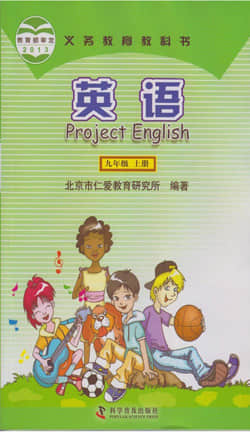Review of Units 3-4课文原文、中英文对照及听力音频听读
Review of Units 3-4 翻译:复习3-4单元
Listen to the joke and mark the intonation of the questions. Then practice telling the joke and pay attention to the sense group. 翻译:听笑话并标记以下问题的语调。然后练习讲笑话并注意寓意。
A Story of a French Student 翻译:一名法国学生的故事
A French student went to London on vacation. He thought, 'I know a little English. Can people understand me?' 翻译:一名法国学生去伦敦度假。他在想,“我只懂一点英语。那里的人能理解我说的话吗?”
One morning, he went to a restaurant and sat down at the table. Soon the waitress came to him. 'Can I help you, sir?' asked the waitress. 'I'd like a cup of tea and ... ' He could not remember the English word, 'egg'. He looked around, but nobody was eating eggs. 翻译:一天早上,他进了一家餐厅并坐下。不一会儿女服务员走过来。“先生,请问您需要点什么?”女服务员问。“一杯茶和……”他不记得英语单词,“鸡蛋”。他朝四周看看,但没有人在吃鸡蛋。
Then he saw a magazine on the table next to him. There was a picture of a rooster on its cover. 'What's the English for this?' the student asked. 'A rooster, sir. ' 'What do you call a rooster's wife?' 'A hen, sir. ' answered the waitress. 'And what do you call a hen's children?' 'Do you mean chicks, sir?' 'Yes. Before chicks are born, what do you call them?' 'Eggs, sir. ' 'Very well. Bring me two eggs and a cup of tea, please. ' 翻译:接着他看到桌子旁边有一份杂志。封面上有一副公鸡的图片。“这个用英语怎么说?”学生问。“公鸡,先生。”“你们是如何称呼公鸡的妻子?”“母鸡,先生。”女服务员回答。“那你们又是如何称呼母鸡的小孩呢?”“你的意思是小鸡吗,先生?”“是的。在小鸡出生前,你们叫它们什么?”“鸡蛋,先生。”“非常好,请给我两个鸡蛋和一杯茶。”
He sat back with a smile on his face. 翻译:他脸上露出微笑坐回去了。
Fill in the blanks with the correct forms of the given words in the box. 翻译:用方框中所给单词的正确形式填空。
realize 翻译:意识到
dry 翻译:干燥的
search 翻译:搜寻
silence 翻译:安静
offer 翻译:提供
communicate 翻译:沟通,交流
Shh! Keep silent! The headmaster is speaking. 翻译:嘘!安静!校长在讲话。
He offered some useful advice on how to solve this problem. 翻译:对于如何解决这个问题他提出了几种有用的建议。
Be careful. The paint hasn't dried yet. 翻译:小心。这幅画还没干。
He spent a lot of time searching for information about Canada last night. 翻译:昨晚他花了大量时间搜寻关于加拿大的信息。
She feels upset because she hasn't realized her dream. 翻译:她感觉心烦意乱,因为她还没有实现自己的梦想。
She is shy. She doesn't know how to communicate with others. 翻译:她很害羞。她不知道如何跟其他人交流。
Complete the passage with that, which or who. 翻译:用that, which 或who完成短文。
Have you seen the film that is called Kungfu Panda? This film mainly tells us a story which happened in ancient China. One of the main characters in it is a panda who is very fat but cute. He has quite a few friends who helped him struggle to bring peace back to the land. Many people that have seen the film like it very much. 翻译:你看过一部名叫功夫熊猫的电影吗?这部电影主要讲述一个发生在中国古代的故事。电影中的一个主演是一只很胖但又非常可爱的熊猫。他有许多帮他为和平而战的朋友。看过这部电影的许多人都很喜欢。
Review of Units 3-4 翻译:复习3-4单元
Have you seen the film is called Kungfu Panda? This film mainly tells us a story which happened in ancient China. One of the main characters in it is a panda who is very fat but cute. He has quite a few friends who helped him struggle to bring peace back to the land. Many people that have seen the film like it very much. 翻译:你看过一部名叫功夫熊猫的电影吗?这部电影主要讲述一个发生在中国古代的故事。电影中的一个主演是一只很胖但又非常可爱的熊猫。他有许多帮他为和平而战的朋友。看过这部电影的许多人都很喜欢。
Change the following sentences into ones that have the same meaning. 翻译:把以下句子转换成相同意义的话。
I don't know what I shall do next. 翻译:接下来我不知道该做什么。
I don't know what to do next. 翻译:接下来我不知道要做什么。
Mr. Green hasn't decided when he leaves for Canada. 翻译:格林先生还没决定什么时候去加拿大。
Mr. Green hasn't decided when to leave for Canada. 翻译:格林先生还没决定什么时候去加拿大。
Do you know where we're going to meet tomorrow? 翻译:你知道明天去哪儿碰面吗?
Do you know where to meet tomorrow? 翻译:你知道明天去哪儿碰面吗?
The man asked which bus he would take to the Summer Palace. 翻译:这个男人问坐几路公交车去颐和园。
The man asked which bus to the Summer Palace. 翻译:这个男人问坐几路公交车去颐和园。
Fill in the blanks with the given words, using the passive voice. 翻译:用所给单词的被动语态填空。
Was he invited to Lily's birthday party last night? 翻译:他昨晚被邀请去莉莉的生日聚会了没?
Sorry, I don't know. 翻译:对不起,我不知道。
Have you watered those flowers, Tim? 翻译:蒂姆,你浇花了吗?
No, I haven't. But those flowers were watered by my grandpa yesterday morning. 翻译:没,我没有。但是昨天早上这些花已经被我奶奶浇过了。
What do you think of this book? 翻译:你觉得这本书怎样?
Wonderful! It is enjoyed by many teenagers. 翻译:很棒!它受许多青少年喜爱。
The class meeting will be held this afternoon. Are you ready for it? 翻译:今天下午将要开班会。你们准备好了吗?
Yes. We're all ready for it. 翻译:是的。我们所有人都准备好了。
Where would you like to go? 翻译:你想去哪?
I'd like to go to the Tower of London. Long ago, it was used as a prison for important prisoners. 翻译:我想去伦敦塔。很久以前,它是用来关押重要犯人的监狱。
Listen to the passage and mark T(True) or F(False). 翻译:听短文并判断正误。
Li Hua likes reading English newspapers and magazines. 翻译:李华喜欢阅读英文报纸和杂志。
Li Hua is good at grammar. 翻译:李华擅长语法。
Li Hua has difficulty in writing. 翻译:李华在写作上有困难。
Li Hua writes twelve new words on pieces of paper and sticks them on the walls in her bedroom to remember them. 翻译:李华写了十二个新单词在纸上,并贴在她卧室的墙上以便记忆。
Li Hua changes the learning method if it doesn't work. 翻译:如果不起作用的话李华会改变学习方法。
Review of Units 3-4 翻译:复习3-4单元
Listen to the conversation and complete the sentences. 翻译:听对话并完成句子。
Kris thinks the light bulb is the most helpful invention. 翻译:克里斯认为灯泡是最有用的发明。
最新学习记录 更新时间:2026-02-27 07:03:52



 切换教材
切换教材